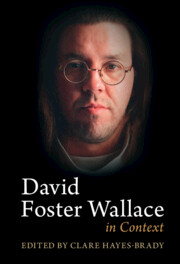Book contents
- David Foster Wallace in Context
- David Foster Wallace in Context
- Copyright page
- Contents
- Figures
- Contributors
- Acknowledgments
- Abbreviations
- Introduction
- Part I Contexts
- Part II Ideas
- Part III Bodies
- Chapter 20 No Ordinary Love
- Chapter 21 “The Limits of His Seductively Fine Mind”
- Chapter 22 David Foster Wallace and Masculinity
- Chapter 23 Theorizing the Other
- Chapter 24 David Foster Wallace and Disability
- Chapter 25 Queering Wallace
- Part IV Systems
- Works by David Foster Wallace
- Bibliography of Secondary Sources
- Index
Chapter 22 - David Foster Wallace and Masculinity
from Part III - Bodies
Published online by Cambridge University Press: 18 November 2022
- David Foster Wallace in Context
- David Foster Wallace in Context
- Copyright page
- Contents
- Figures
- Contributors
- Acknowledgments
- Abbreviations
- Introduction
- Part I Contexts
- Part II Ideas
- Part III Bodies
- Chapter 20 No Ordinary Love
- Chapter 21 “The Limits of His Seductively Fine Mind”
- Chapter 22 David Foster Wallace and Masculinity
- Chapter 23 Theorizing the Other
- Chapter 24 David Foster Wallace and Disability
- Chapter 25 Queering Wallace
- Part IV Systems
- Works by David Foster Wallace
- Bibliography of Secondary Sources
- Index
Summary
Wallace wrote about masculinity throughout his career, from The Broom of the System’s (1987) parodies of neurotic macho posturing to The Pale King’s (2011) encomiums to white-collar workers. It is peculiar, then, that critical attention to Wallace’s treatment of masculinity is still spotty. Part of the reason for this, perhaps, is that Wallace’s gender politics were rather conservative, and therefore anathema to scholarly communities rightly committed to challenging traditional ideas of masculinity. However, there is more nuance, complication and ambiguity in Wallace’s depictions of masculinity than is normally acknowledged, even if his works do remain broadly masculinist in their tenor, and given to portraying a kind of “masculinity in crisis.” This chapter examines these points of interest and dissonance by drawing particular attention to the following overlapping themes: sport and the body, fatherhood, and class, offering grounds from which scholars can investigate this topic in greater detail. Similarly, although Wallace’s texts generally resist being recruited into a progressive gender politics, I argue that their depictions of masculinity are nevertheless worth considering. By paying attention to masculinity in his work, we can further explicate Wallace’s aesthetic innovations, better historicize his relation to patriarchy, and – as the case may be – reaffirm the need to criticize what he has to say about men.
Keywords
- Type
- Chapter
- Information
- David Foster Wallace in Context , pp. 236 - 245Publisher: Cambridge University PressPrint publication year: 2022



